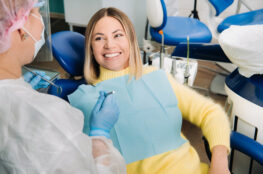The party season is well and truly upon us, and although it means a lot of fun for all, it could also mean disaster for your oral health. Drinking alcohol has been a festive tradition for lots of people for many, many years, and it doesn’t look to become any lesser part of the celebrations anytime soon.
It is commonly known that drinking can be harmful to your body, but are you aware of the detrimental effects it can have on your teeth also?
We wanted to delve into some of the ways alcohol can negatively impact your oral health and share our best advice for drinking responsibly to protect your teeth from the effects of alcohol this holiday season.
How Does Alcohol Affect Your Teeth?
The main issues caused my drinking alcohol are:
Dry Mouth
Alcohol dries up the saliva in your mouth, and with less saliva, bacteria is more likely to grow on your teeth and gums, which can lead to:
- Bad Breath – Dry mouth causes bad breath because when you don’t have enough saliva, it’s harder for the mucus membranes inside your mouth (which trap bacteria) to clean themselves off and get rid of odour-causing substances like hydrogen sulphide or methyl mercaptan gas.
- Tooth Decay/Gum Disease – By not having enough saliva in our mouths, we are more susceptible to tooth decay due to the decreased acid neutralising effects of saliva.
Gum Disease
One potential effect of alcohol consumption is gum disease. Gum disease is caused by bacteria that accumulate on teeth and gums, leading to inflammation and pain. It’s estimated that nearly half of the adult population suffers from gum disease at some point in their life, but regular brushing and flossing can help prevent it from occurring in the first place. Alcoholic drinks are known to increase bacteria levels in saliva, which then causes plaque build-up around your teeth.
Tooth Decay
When you drink alcohol, it is broken down into sugar, and it can cause tooth decay just like any other amount of sugar you eat. The sugar in your mouth is a food source for cavity causing bacteria. The acid produced by the bacteria causes damage to your teeth and, if left unchecked, can lead to decay.
Breakdown of Enamel
Alcohol is a major culprit of enamel erosion.
The breakdown of enamel occurs when you’re consistently exposed to substances that are high in sugar content or acidity. The sugar content of alcohol encourages bacterial growth on your teeth, which eats away at the enamel over time. Acidic drinks erode your tooth enamel as well because it lowers its pH level and causes overexposure to harmful acids in food and drinks (such as wine). Alcoholic beverages have both sugar content and acidity levels higher than most other beverages—making them doubly damaging for our teeth!
The Increased Risk of Accidental Trauma
Alcohol can make you feel more confident, and it’s easy to understand why. Alcohol lowers inhibitions and increases your willingness to take risks (whether or not you realize what those risks are). This creates a greater chance of you falling or being involved in an accident when intoxicated, which could lead to accidental trauma or facial injury such as a tooth being fractured or knocked out.
Oral Cancer
It is widely understood that the consumption of alcohol can increase your risk of mouth cancer. You can find out more about mouth cancer in our previous blog posts Mouth Cancer Awareness and Everything You Need to Know About Mouth Cancer.

Protecting your teeth whilst drinking
There are several ways that you can protect your teeth from the negative effects of drinking alcohol, this party season try to:
Avoid drinking on an empty stomach – This will increase the chances of stomach acid reflux which can lead to tooth decay or erosion.
Drink in moderation – This means no more than one or two drinks per hour. Consider having an alternative beverage such as water as well as alcohol so that you don’t feel left out!
Drink water between alcoholic beverages – This will help to dilute the alcohol in your mouth and rinse your teeth of bacteria.
Choose drinks with less sugar and acid – The lower the sugar content, the more tooth-friendly the beverage is.
Brush and floss your teeth after a night of drinking – This will help to clear your mouth of lingering harmful bacteria.
In between the social gatherings this festive period you can help your teeth stay strong and healthy by brushing with fluoride toothpaste twice a day for 2 minutes, flossing or using interdental brushes once a day, and if you wish you can rinse with mouthwash in between meals- but make sure it is alcohol free mouthwash!
If you are at all worried about your oral health at this time of year you can always book a check-up or hygienist appointment in the new year to put your mind at ease and ask any further questions you may have.
If you have damaged your teeth due to drinking, call us on 01865 761965 to discuss how we can help.




